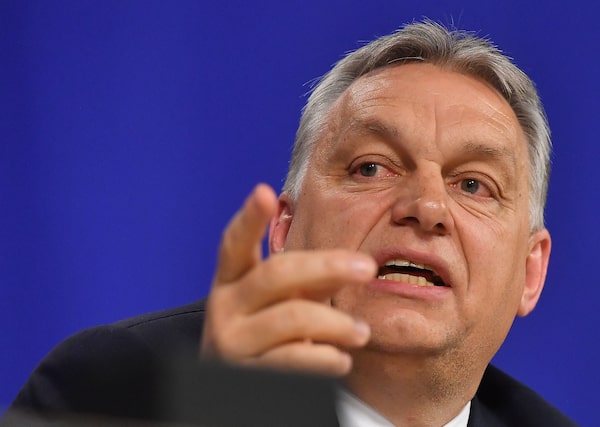
Hungarian Prime Minister Viktor Orban has been a supporter of Russian President Vladimir Putin, much to the frustration of the rest of Europe.EMMANUEL DUNAND/AFP/Getty Images
Timothy Garton Ash, Professor of European Studies at Oxford University, is currently writing a history of contemporary Europe.
As I stood in a cold, disconsolate crowd in central Budapest late on Sunday night, listening to Hungarian opposition leader Peter Marki-Zay concede defeat in the country’s election, the Twitter feed on my phone filled with images of murdered Ukrainian civilians in the town of Bucha. The Ukrainian horrors are clearly far worse than the Hungarian miseries, but the two are fatefully connected.
It is a bitter irony that, just as we learn of some of the worst atrocities in Russian President Vladimir Putin’s war of terror against Ukraine, Mr. Putin’s closest ally among EU leaders, Hungarian Prime Minister Viktor Orban, is re-elected. As well as exploiting all the advantages he has already built into a heavily rigged political system, such as gerrymandered constituencies and overwhelming media dominance, Mr. Orban won by telling Hungarians that he would keep them out of this war – and that their heating bills would stay low because of his sweet gas deals with Mr. Putin.
In his victory speech, the Hungarian leader listed the “opponents” he had defeated, including the international media, Brussels bureaucrats and Ukrainian President Volodymyr Zelensky, who has criticized him fiercely for his opposition to the weapon supplies and further sanctions that Ukraine desperately needs. Mr. Orban’s friend Mr. Putin, meanwhile, hastened to congratulate him on his victory.
If the Hungarian six-party opposition coalition led by Mr. Marki-Zay had won, Hungary would have become a staunch Western ally in the face of Russian aggression, as other central European countries such as Poland and the Czech Republic are proving to be. An opposition government would also have joined the European Public Prosecutor’s Office, enabling the pursuit of well-documented corruption in the use of EU funds. They would have kicked out the International Investment Bank, which the opposition says is closely linked to the Putin regime. And they would have set about the difficult process of turning Hungary back into a proper liberal democracy.
Instead, Mr. Orban’s Fidesz party once again secured a two-thirds supermajority, enabling it to change the constitution at will. Whatever honeyed assurances it gives in Brussels or Washington, it will continue to consolidate what political scientists describe as an electoral authoritarian regime. Hungary’s political system is now closer to that of non-EU Serbia, which this weekend saw a simultaneous victory for another nationalist electoral authoritarian, President Aleksandar Vucic, than it is to that of a democracy like France or Portugal. Indeed, Mr. Orban and Mr. Vucic are close allies.
There were significant failings by the opposition. The six parties were not as united as they should have been, and the lead candidate obviously failed to convince the electorate outside Budapest. Overall, the opposition actually lost votes. But there is no way in which this was a fair election.
Yet having spent lavishly on tax and welfare handouts to win the election, Mr. Orban’s government needs EU funds to fill a big hole in its finances. Unless the EU is prepared simply to accept that it now has an authoritarian member state, it should at long last impose rigorous conditionality on the flows of European money which have long been one of the main founts of Mr. Orban’s power. This means continuing to withhold COVID-19 recovery grants and loans, since transparency cannot be guaranteed by a regime that is actually built on the corrupt use of EU money. It also means finally triggering the rule of law conditionality mechanism which could hold back significant chunks of funding from the EU’s regular budget, and not being fooled into giving Hungary lots of money for Ukrainian refugees who have in fact already moved on to other countries.
But faced with the latest evidence of the barbaric behaviour of Russian troops in Ukraine, Europe needs to step up its sanctions on Mr. Putin. When Mr. Orban returned from back-to-back summits of NATO and the EU in Brussels last month, his government sent an e-mail to all Hungarians who had signed up for a COVID-19 vaccine saying that “proposals were put on the agenda against which Hungary’s interests had to be protected.” His government would never allow weapons supplies to go through Hungary to Ukraine, nor sanctions to be imposed on the 85-per-cent of gas and 64-per-cent of oil in Hungary that comes from Russia. In response to the Bucha atrocities, EU leaders such as French President Emmanuel Macron are now calling for more sanctions, including on Russian oil. Self-styled “realists” may argue that Brussels now has to stay soft on Hungary in order to keep Mr. Orban on board for a common front over Ukraine.
Europe should now get tough on both the Russian enemy without and the Hungarian enemy within. But can it and will it do both at once? Here is another dilemma this dark depressing weekend has presented to a deeply shaken Europe.
Keep your Opinions sharp and informed. Get the Opinion newsletter. Sign up today.